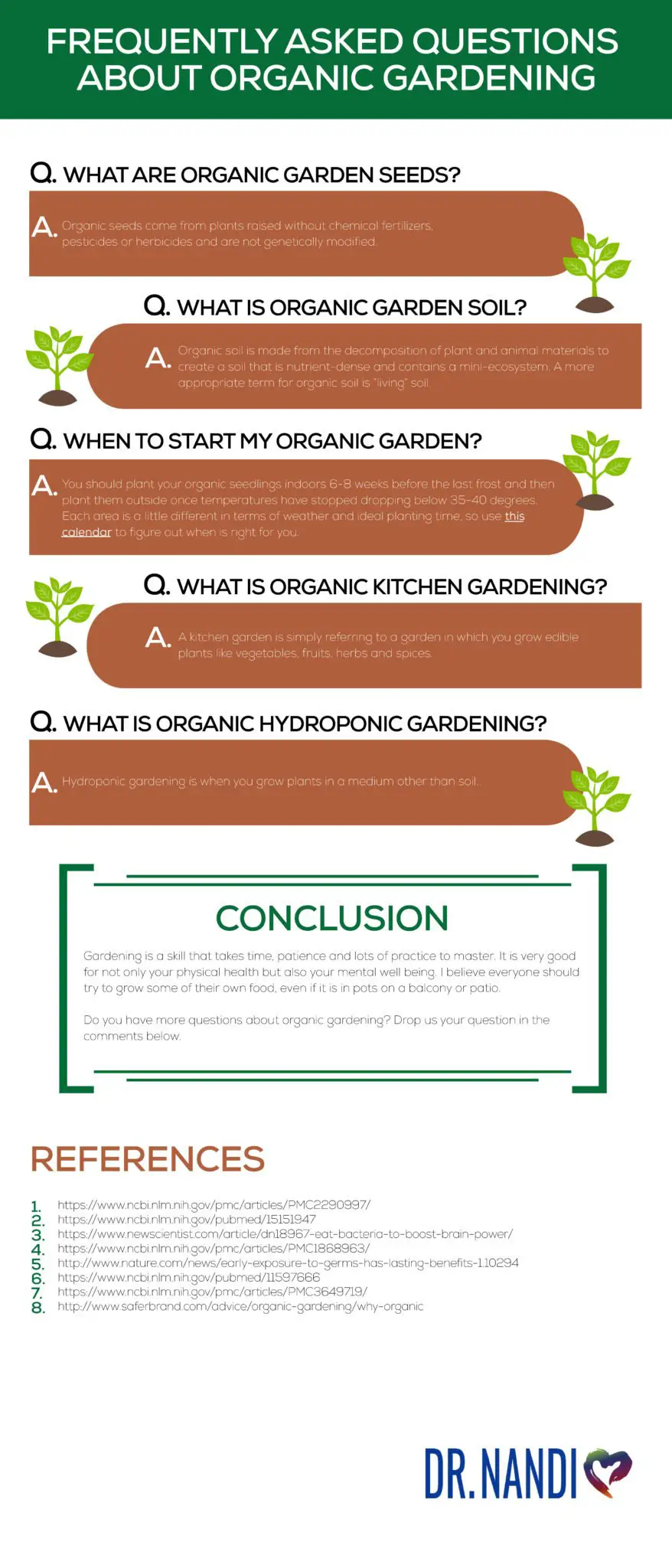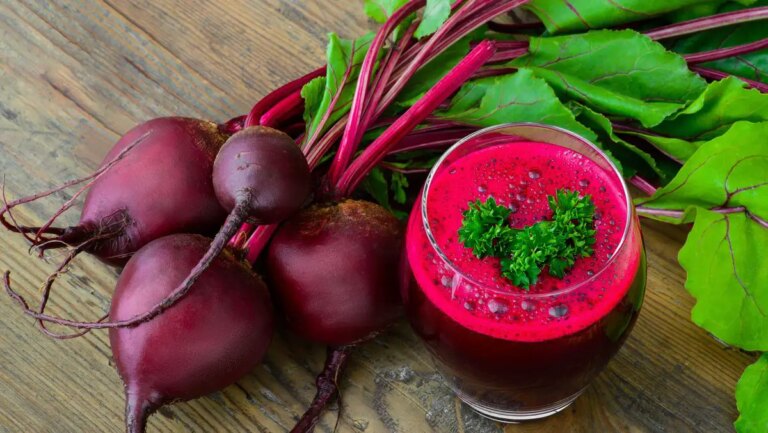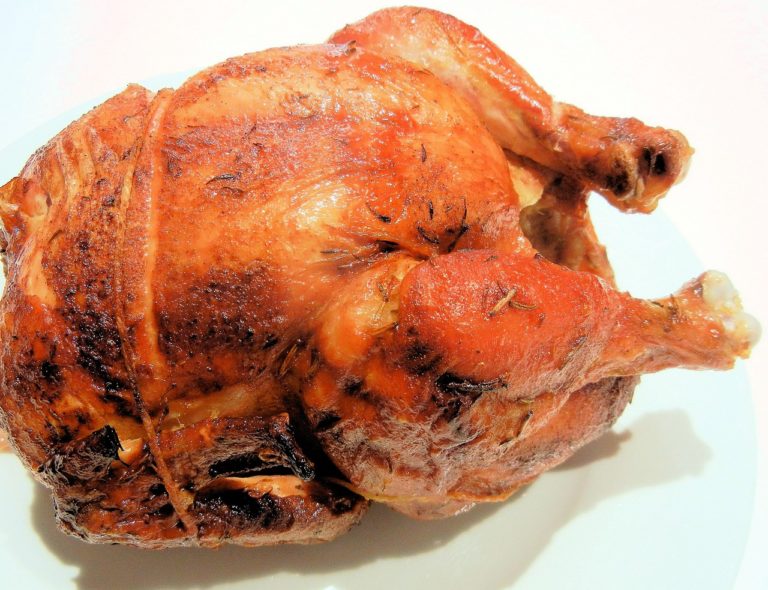Gardening is a wonderful way to spend time outdoors; connecting with the earth, getting a little dirty and becoming familiar with the food you eat every day. I love seeing families out working in their gardens together. What an excellent environment to raise children in!


 Benefits To Starting An Organic Garden
Benefits To Starting An Organic Garden
- Vitamin D. Spending time outdoors in the sun will help you increase levels of vitamin D. Experts agree that at least 20 minutes outside in the sun is necessary for optimum exposure. (1)
- Improve gut health. There are tremendous benefits to spending time outdoors in the dirt for your microbiome! Being in contact with the earth exposes your immune system to trillions of microorganisms that exist in the ground and on plants. Studies have found that exposure to soil bacteria can improve quality of life by increasing feelings of happiness, vitality and improving cognitive function. (2, 3)
- Improve mental health. One study found that certain kinds of soil bacteria help to activate groups of neurons in the brain responsible for producing serotonin, aka the “happy hormone”. (4)
- Improve immunity. Researchers have confirmed that exposure to outdoor microbes in childhood is linked to a more robust immune system and is linked to lower rates of asthma and allergies. (5, 6)
- Teach kids about real food. Kids who garden with their parents understand where food comes from. I’ve found that when kids help to grow their own vegetables and other foods, they are more likely to try them during dinner and be less picky about what they eat. It is exciting to see the process from planting a seed to picking a vegetable and adding it to a meal.
- Improve overall health and well being. Eating fresh, seasonal food from your garden is incredible for your health. Whole foods are nutrient-dense, anti-inflammatory and increase your energy and vitality. (7)
Why An Organic Garden?
Organic gardening is a chemical and GMO-free method of gardening where you work WITH nature instead of against it. Those who use organic gardening methods believe that “nature knows best” and use natural strategies and tools to help their garden thrive.
Organic gardening helps to preserve and feed the land so that you can use it for years to come versus conventional farming practices which deplete the soil of nutrients. Because soil diversity and health is preserved and supported, the food grown in it has rich flavor and higher vitamin and mineral content. (8)
When you avoid using toxic chemicals like conventional pesticides and herbicides, you are not only saving you and your family from potentially severe health consequences, but are also helping to keep the water supply clean, the local ecosystem and wildlife healthy and reducing the demand for these chemicals to be made in the first place.
Step-By-Step Guide To Starting Your Organic Garden
Choose Your Garden Space
When you aspire to plant a garden you first need to choose the best location for planting. Choose a site that gets plenty of sunlight (6-8 hours a day of full sun), has well-drained soil and in a convenient location for you to check on it daily. If the soil in your yard doesn’t drain well (remains wet and cold well into spring, remains wet long after rain has stopped, etc) you may want to consider installing some type of draining system OR building raised beds. Many backyard gardeners enjoy raised beds because they are easier to keep free of weeds and you don’t have to bend so far down to work in the soil.
Feed Your Soil
All plants need food in the soil in order to grow. If you want, you can get a home soil-testing kit that can tell you an exact breakdown of pH and nutrient levels in your garden soil. Or you can just make sure to follow some good soil health practices to keep the dirt in good shape for growing. If you are struggling to grow good quality crops, the home testing kit might be a good idea so you can figure out what’s going on.
The #1 thing you can do for your soil is to mix in good quality compost regularly. Compost can consist of kitchen scraps, leaf and grass clippings and manure.
How To Make Good Garden Compost
- Dedicate a 3 square foot area in your yard for a compost pile. You can put it directly on the ground or have it in large pens/bins to keep things more tidy.
- Add alternating layers of carbon material (leaves, garden trimmings) and nitrogen material (kitchen scraps, manure) and thin layers of soil. Keep it somewhat moist to support microbe action.
- When you add new layers, you can turn the layers to mix them up and bring bottom layers to the top.
- A good compost pile can be made in about two months. You can keep it going continuously through the warm months and take out chunks to add to your garden and pot soils.
- The compost should NOT get smelly. If it does, add straw, leaves or a little sawdust.
Compost will keep your soil healthy, help to minimize weeds and will help you grow nutrient-dense vegetables and plants.
Where To Buy Organic Garden Soil
You can get organic garden soil from local growers, garden centers and farmers. Join local gardening groups on social media to connect with others near you who are interested in organic gardening. You can also find organic gardening soil at many stores that contain garden supplies, but make sure the soil is certified by the USDA or OMRI.
When choosing soil, find one that smells earthy and avoid any that have a rotten or sulfuric smell.
Choose Your Plants
When choosing your plants, use the USDA’s Hardiness Zones to find what plants will thrive in your particular location. Most seeds have the same color code on the back of the package or you can search online to determine veggies, herbs and plants that will grow easily in your yard.
Also think about what plants you like to use in your kitchen. What are your favorites vegetables, herbs, spices and fruits? Check to see how many of them can be grown successfully in your state.
If you are a beginner gardener, you might want to start with easier plants to give you some practice and boost your confidence. Some good beginner plants include tomatoes, non-hybrid pole beans, zucchini, Swiss chard, snow peas, sugar snap peas and corn.
Once you know what plants you are going to buy, look for seedlings raised without chemical fertilizers and pesticides and/or organic seeds when possible. Local farmer’s markets often carry seedlings and plants you can buy that were grown organically.
Where To Buy Organic Seeds
There are many sources online from which you can buy quality, organic seeds. Organic seeds come from plants that were grown without chemical pesticides and herbicides and aren’t genetically modified. Here are a few popular sources from which to buy organic seeds:
Planting
For plants that will be harvested for food, group plants closely together in areas that you don’t walk on. Putting them close together helps to reduce weeds and makes it easier to water without wasting. You should, however, leave wide rows in between groups of plants for good air circulation to reduce fungal attacks.
Companion planting is a good way to reduce pests and improve soil composition.
You should also rotate your crops every year so that you aren’t planting the same plants in the same soil every season. This helps to keep your soil healthy and diverse and also keeps pests from knowing exactly where to find their favorite food in your garden every year.
Watering
In order to conserve water and minimize weeds, I recommend using drip irrigation. This delivers water directly to each plant instead of pouring water over a general area. While it can take some time to set up properly in the beginning, it will save you a lot of time and trouble in the long run.
Watering your garden in the morning helps to reduce evaporation so that your plants can absorb as much water as possible. If you water in the evening, the plants will likely stay moist overnight, increasing the chance of bacterial and fungal infections.
Natural Pest & Weed Control
For tips on how to prevent weeds and pests in your organic garden, see our more comprehensive post here:
Organic Gardening 101: Non-Toxic Weed & Pest Control
Frequently Asked Questions About Organic Gardening
Q. What are organic garden seeds?
A. Organic seeds come from plants raised without chemical fertilizers, pesticides or herbicides and are not genetically modified.
Q. What is organic garden soil?
A. Organic soil is made from the decomposition of plant and animal materials to create a soil that is nutrient-dense and contains a mini-ecosystem. A more appropriate term for organic soil is “living” soil.
Q. When to start my organic garden?
A. You should plant your organic seedlings indoors 6-8 weeks before the last frost and then plant them outside once temperatures have stopped dropping below 35-40 degrees. Each area is a little different in terms of weather and ideal planting time, so use this calendar to figure out when is right for you.
Q. What is organic kitchen gardening?
A. A kitchen garden is simply referring to a garden in which you grow edible plants like vegetables, fruits, herbs and spices.
Q. What is organic hydroponic gardening?
A. Hydroponic gardening is when you grow plants in a medium other than soil.
Conclusion
Gardening is a skill that takes time, patience and lots of practice to master. It is very good for not only your physical health but also your mental well being. I believe everyone should try to grow some of their own food, even if it is in pots on a balcony or patio.
Do you have more questions about organic gardening? Drop us your question in the comments below.
References
- https://www.ncbi.nlm.nih.gov/pmc/articles/PMC2290997/
- https://www.ncbi.nlm.nih.gov/pubmed/15151947
- https://www.newscientist.com/article/dn18967-eat-bacteria-to-boost-brain-power/
- https://www.ncbi.nlm.nih.gov/pmc/articles/PMC1868963/
- http://www.nature.com/news/early-exposure-to-germs-has-lasting-benefits-1.10294
- https://www.ncbi.nlm.nih.gov/pubmed/11597666
- https://www.ncbi.nlm.nih.gov/pmc/articles/PMC3649719/
- http://www.saferbrand.com/advice/organic-gardening/why-organic


















